|
|
|
Sort Order |
|
|
|
Items / Page
|
|
|
|
|
|
|
| Srl | Item |
| 1 |
ID:
089893
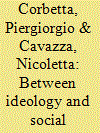

|
|
|
|
|
| Publication |
2009.
|
| Summary/Abstract |
This study analyses the relevance and the meaning given by Italians to the political labels 'left' and 'right' between 1975 and 2006. Based on responses to the open-ended question 'What do you mean by "left/right" in politics?', the study compares five alternative hypotheses on the meaning of the left-right axis and show that, despite the alleged end of ideologies, the relevance of the axis has increased over time. A core of abstract meanings persists throughout the thirty-year period considered. As the importance of abstract meanings has increased over time, reference to more concrete contents (such as 'parties' and 'leaders') has decreased. The findings thus support the hypothesis that the left-right axis has the functional characteristics of social representations.
|
|
|
|
|
|
|
|
|
|
|
|
|
|
|
|
| 2 |
ID:
061052
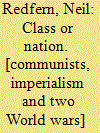

|
|
|
|
|
| Publication |
London, Tauris Academic Studies, 2005.
|
| Description |
x, 257p.
|
| Series |
International library of Political studies; 2
|
| Standard Number |
1850437238
|
|
|
|
|
|
|
|
|
|
|
|
Copies: C:1/I:0,R:0,Q:0
Circulation
| Accession# | Call# | Current Location | Status | Policy | Location |
| 049552 | 320.50942/RED 049552 | Main | On Shelf | General | |
|
|
|
|
| 3 |
ID:
006532
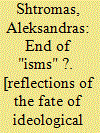

|
|
|
|
|
| Publication |
Oxford, Blackwell Pub., 1996.
|
| Description |
234p.
|
| Standard Number |
0631190554
|
|
|
|
|
|
|
|
|
|
|
|
Copies: C:1/I:0,R:0,Q:0
Circulation
| Accession# | Call# | Current Location | Status | Policy | Location |
| 038270 | 320.5/SHT 038270 | Main | On Shelf | General | |
|
|
|
|
| 4 |
ID:
000643
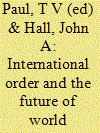

|
|
|
|
|
| Publication |
Cambridge, University press, 1999.
|
| Description |
xx,421p.
|
| Standard Number |
0521551387
|
|
|
|
|
|
|
|
|
|
|
|
Copies: C:1/I:0,R:0,Q:0
Circulation
| Accession# | Call# | Current Location | Status | Policy | Location |
| 042031 | 327.1/PAU 042031 | Main | On Shelf | General | |
|
|
|
|
| 5 |
ID:
165782
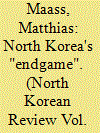

|
|
|
|
|
| Summary/Abstract |
Article Type: Commentary Essay Purpose—Much of the debate on North Korea assumes that Pyongyang would be truly satisfied with the overall status quo if it were only safe and secure enough. The purpose here is to argue that Pyongyang may instead be looking for reunification from a position of strength. Method—The short paper is built mostly on secondary-source research. It uses short historical case studies in addition to professional writings, both academic and journalistic. Findings—Overall, the argument is that Pyongyang has never abandoned the goal of unifying the peninsula under its own leadership. In fact, its "endgame" is a DPRK that spans the entire peninsula and unites the entire Korean people. Implications—To go forward and work with a nuclear North Korea towards a mutually agreeable long-term arrangement on the peninsula, understanding the long-term goals of Kim Jong Un is critical. The argument presented here may instill more caution in negotiation partners and statesmen/-women, especially in Seoul, Washington, and Tokyo, but also in Beijing and Moscow.
|
|
|
|
|
|
|
|
|
|
|
|
|
|
|
|
| 6 |
ID:
005445
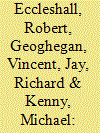

|
|
|
|
|
| Edition |
2nd ed.
|
| Publication |
London, Routledge, 1994.
|
| Description |
xv, 302p.
|
| Standard Number |
041509982X
|
|
|
|
|
|
|
|
|
|
|
|
Copies: C:1/I:0,R:0,Q:0
Circulation
| Accession# | Call# | Current Location | Status | Policy | Location |
| 036688 | 320.5/ECC 036688 | Main | On Shelf | General | |
|
|
|
|
| 7 |
ID:
133229
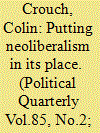

|
|
|
|
|
| Publication |
2014.
|
| Summary/Abstract |
Neoliberalism is not as popular as its opponents seem so much to fear; in democratic politics it nearly always hides behind other ideologies and policy types, as its essential message that we should pursue no goals that cannot be achieved through the market is intrinsically unattractive to the majority of people. Its power lies in the wealth of its key supporters, and in the difficulty of raising coordinated opposition to it among post-industrial populations that have little sense of their political interests. The main base for hope of change in this comes from the as yet unrealised potential of women's movements.
|
|
|
|
|
|
|
|
|
|
|
|
|
|
|
|
| 8 |
ID:
095800
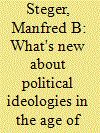

|
|
|
|
|
| Publication |
2010.
|
| Summary/Abstract |
The defeat of Nazi Germany in 1945 and the collapse of the Soviet Empire in 1991 enticed scores of Western commentators to relegate 'ideology' to the dustbin of history. Proclaiming a radically new era in human history, they argued that ideology had ended with the final triumph of liberal capitalism. This dream of a universal set of political ideas ruling the world came crashing down with the Twin Towers of the World Trade Center on 11 September 2001. Since then, influential political leaders have argued that the contest with jihadist Islamism represents much more than the military conflict. It is, as Presidents Bush and Obama put it, the 'decisive ideological struggle of our time'.1 Far from being moribund, then, competing political belief systems are alive and well in the early twenty-first century.
|
|
|
|
|
|
|
|
|
|
|
|
|
|
|
|
|
|
|
|
|